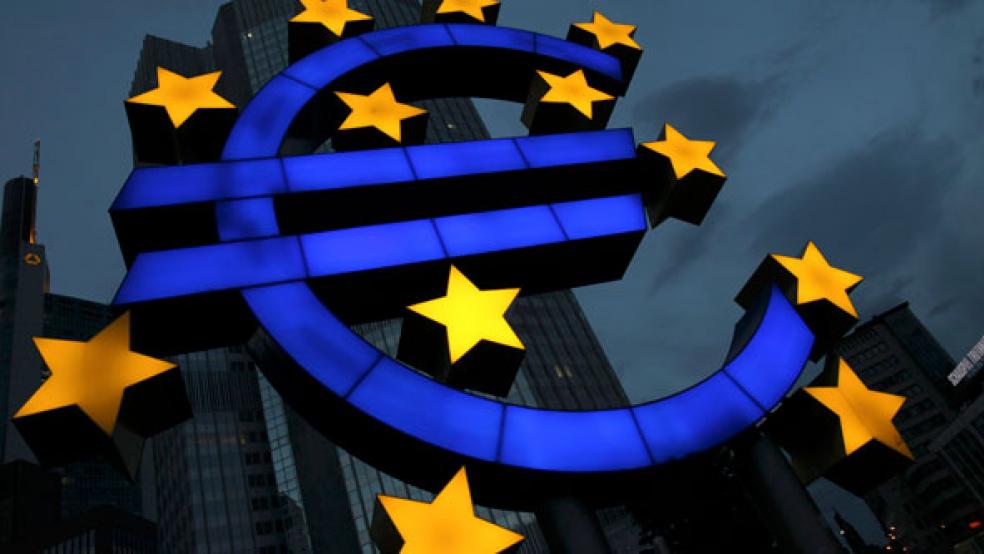While Washington grapples with a credit downgrade and market turmoil, the Euro crisis has returned with a fury. Just weeks after Europe fashioned yet another plan to avoid a Greek default on its sovereign debt, global financial markets are now demanding that Italy and Spain pay more to borrow money -- and they may soon need their own bailouts.
The European Central Bank signaled on Sunday that it will invest in European bond markets in an attempt to prop up hard-hit Italy and Spain, Europe’s fourth and fifth largest economies. ECB’s intervention, along with a vow by the G-7 nations to take “all necessary measures to support financial stability and growth appeared to buoy the bonds of both nations, or at least temporarily.
...if the Euro crisis brings down European banks, the backwash will be a body blow to the American financial system.
But the real danger emanating from Europe is the lingering weakness of its banking sector. There is a distinct possibility, said Eric Chaney, chief economist of the AXA Group, the giant French insurance company, “of a negative feedback loop between the sovereign debt crisis and the banking system.” And if the Euro crisis brings down European banks, the backwash will be a body blow to the American financial system.
Over the last two years, Europe’s bailouts of Greece, Ireland and Portugal were largely motivated by an unacknowledged desire to avoid banking problems of continental proportions. As of March, according to the Bank for International Settlements, German banks held $522 billion in Greek, Irish, Portuguese, Spanish and Italian debt and French banks were owed $672 billion. Some of Europe’s most prominent financial institutions are dangerously exposed. Commerzebank’s holding of such debt equal 462% of its equity; BNP Paribas holdings total 358%, according to estimates by Themes Investment Management.
Multiple European sovereign defaults would expose these weaknesses. French banks are “less capitalized than their European peers,” concluded the International Monetary Fund in its recent survey of the French economy. And German banks are “highly leveraged, with consistently low profitability and a relatively high share of non-performing loans,” the IMF found in its recent overview of the German economy.
As Carmen M. Reinhart, a former IMF economist now teaching at the University of Maryland, has noted: “European banks will, most likely, require further assistance from their respective governments in the recapitalization process.” And the price tag won’t be cheap. Standard & Poor’s estimates that European banks need about $350 billion of additional capital.
American banks have $678 billion in direct exposure to European banks.
European leaders took the first step in that direction in late July by authorizing, for the first time, use of some of the cash in the European Financial Stability Facility to help recapitalize banks. But the fund, which was designed to bail out governments, is woefully short of resources.
Given Wall Street’s close transatlantic ties, a European banking crisis would soon spread to the United States. American banks have $678 billion in direct exposure to European banks, according to the latest Bank for International Settlement figures.
In addition, American financial institutions have hundreds of millions of dollars in European exposure through derivatives, loan guarantees and credit commitments. In Italy, for example, U.S. banks have $16.1 billion in direct bank exposure and $248 billion in other potential exposure.
In a banking crisis not all these loans and other exposure would be at risk. But U.S. financial institutions could have significant capital tied up for a prolonged period of time while Europe sorted out its difficulties.
Moreover, financial interdependence runs both ways. French banks have $122 billion in U.S.-based banks; German banks have $119 billion. If European banks get in trouble, they will bring some of that capital home. Anecdotal evidence suggests it is already happening.
And whether U.S. banking capital gets tied up in Europe or European capital is called home, that means less money available to U.S. borrowers at a time when the U.S. economy is struggling to gain traction.
The IMF and the Obama administration have been quietly pressing the Europeans to recapitalize their banks, closing those that are too weak to survive. Europe’s new authority to use some of its available bailout money to do that is a step in the right direction. But more funds are needed. And that will require 27 national parliaments across Europe to agree, no easy task.
To date, European politicians have not been straight with their electorates about the seriousness of their banking sector’s problems. It is certainly in America’s self interest that Europeans now engage in some straight talk to their voters and tough love with their bankers.




